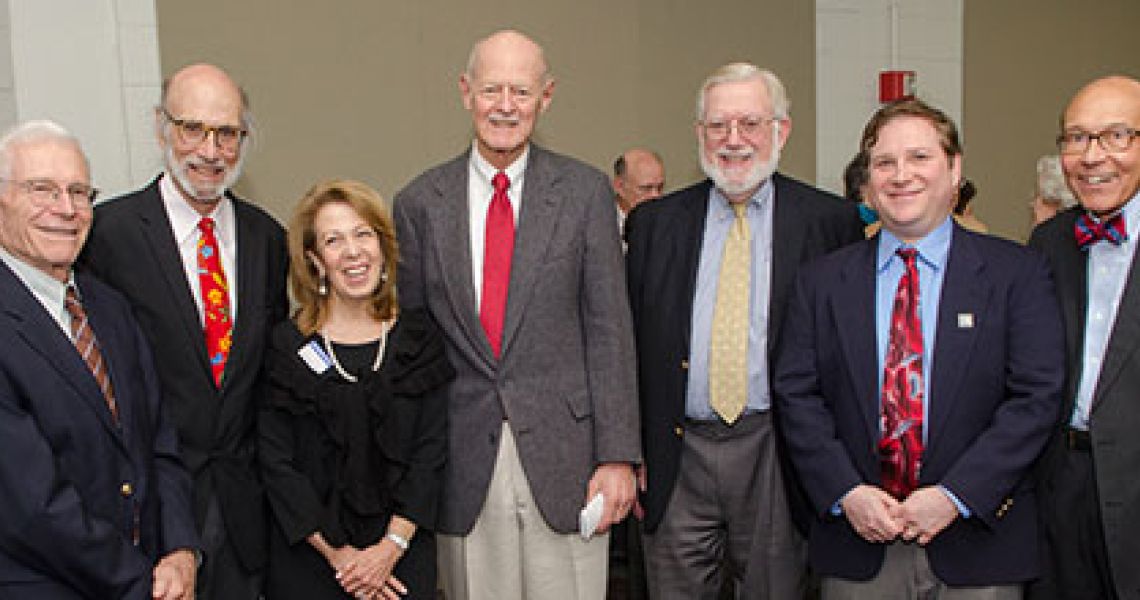“My writing is about three things: resistance to injustice, particularly in medicine; the danger of isolation; and the healing power of a good connection,” said Stephen Bergman, M.D., Ph.D., psychiatrist and author of the landmark, best-selling medical novel, “The House of God.” Written under the pen-name Samuel Shem, M.D., the novel depicts the psychological harm done to medical interns during the course of a medical internship in the early 1970s. His 2008 follow-up novel, “The Spirit of the Place,” tells the story of an expatriate doctor called home to Columbia, New York in the early 1980s to face his own history. Bergman described his journey as a physician and writer and how those two worlds intertwined at the 8th Annual Stuart M. Fidler, M.D., Memorial Lecture hosted by the George Washington University School of Medicine and Health Sciences (SMHS), Nov. 6.
Matthew Mintz, M.D. ’94, RESD ’97, associate professor of medicine and director of the primary care clerkship at SMHS, welcomed students, staff, faculty, and alumni to the endowed lecture.
Created in 2005 by Fidler’s family and friends, the lecture honors his career in medicine and celebrates his contributions to the teaching efforts of the SMHS Department of Medicine, where he served as a clinical professor of medicine in 1973. Fidler also practiced internal medicine and endocrinology in downtown Washington, D.C., for 30 years. The annual lecture focuses on humanism in medicine.
Friend and former colleague of Fidler, Robert Wilkinson, M.D., MACP, Professor Emeritus of Clinical Medicine at SMHS, described Fidler as a superb physician, who was knowledgeable, conscientious, and always treated his patients with compassion. “It was thought that by learning about the manner in which Dr. Fidler practiced medicine and hearing lectures on this topic, medical students would begin to appreciate the importance of combining the art of medicine with the science of medicine in order to deliver excellent patient care,” he said.
“If Stuart were here today, he would tell you all that you chose your profession well,” said Fidler’s widow, Jane, addressing the audience. “There are certainly other professions you could have chosen that would be less demanding of your time and less stressful, however, there is no other profession that will give you the opportunity to touch people’s lives in such an important, personal, meaningful way as the study of medicine.” Jane encouraged the medical students to always put their patients’ needs first and treat them with compassion and empathy.
Bergman’s talk, titled “Staying Human in Medicine: From ‘House of God’ to ‘The Spirit of the Place’,” discussed the different aspects of humanism in medicine.
“People hated my book when it came out,” said Bergman, referring to the initial backlash when “The House of God” was published in 1978. Bergman didn’t mind because he knew he was telling the truth about life as a medical intern in 1974 at Beth Israel Hospital, a Harvard Medical School teaching hospital. In his book, Bergman described the hard, often distasteful work interns performed, the poor working conditions, the lack of sleep, and the lack of time available to spend with friends and family.
“One of the things I have learned in life is that you never fully understand what goes into making a decision or what influences you to take certain actions until years later,” he said. Looking back, Bergman realized that he never had complete control over his decision making process. “There have always been historical and cultural forces that have influenced you along the way,” he added.
Early in his internship, Bergman had a patient who was diagnosed with metastatic breast cancer, an advanced stage of cancer where the disease has spread to distant sites. No one ever took the time to explain to her the severity of her condition. Bergman remembered the nurse telling him that since he was her intern he should administer her test results.
As he wrote in “The House of God,” “The nurse handed me the clipboard, saying, “Don’t worry, it’s hopeless, end-stage breast cancer, metastatic throughout pelvis, abdomen, and spine.” It was awful.
No one told Bergman how to deliver bad news to a patient. Bergman gave advice to the medical students in the audience; “let your patient ask questions, give them a straight answer, and never run out of the room after delivering the news,” he said. The way doctors deliver news has an enormous effect on patient outcomes.
In closing, Bergman summed up what he had learned about humanism in medicine. “Stayed connected with your patients, don’t isolate them” he said. “Speak up when you witness abuse in a medical situation.” For Bergman and his colleagues, that meant joining forces and taking action to change things for the better; whether it was an unjust procedure or policy, or disrespectful behavior. “Ethically, you have to bring attention to the mistreatment because if you don’t, you are an accomplice to the abuse,” he added.
Most importantly, he said, always show empathy towards your patients. Bergman recalled how one of his fellow residents described empathy, as repeating the last three words the patient says and nodding their head. For a resident, learning empathy is learning to put themselves in their patient’s shoes. Bergman said it best in his book, “The House of God”, “with me, they still feel part of the human race. The way to stay human is to move toward others. Lean into life, not away. America places a terribly high value on the individual. But happiness is not an individual matter.” “Remember,” he told the audience, “the patient is never just the patient. The patient is also their family, friends, loved ones, and their communities.”



